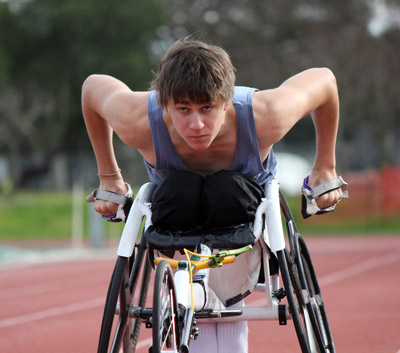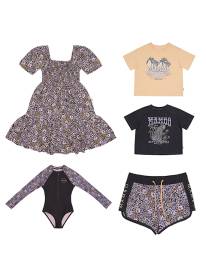Sam McIntosh USANA Athlete Ambassador Paralympic Interview

Sam McIntosh USANA Athlete Ambassador Paralympic Interview
Sam McIntosh's life was turned upside down in 2007 when a BMX accident broke Sam's neck, leaving him a Quadriplegic. While recovering in hospital, the thrill-seeking boy from Geelong immediately drew inspiration from stunt men he saw performing back flips in their wheelchairs and turned his attention to wheelchair rugby. However, a chance meeting with Kaye Colman, the mother of Paralympic gold medallist Richard Colman, directed Sam down the path of wheelchair racing.
In the space of 18 months, Sam went from learning the ropes of track athletics in a wheelchair to becoming one of Australia's most promising athletes. Training with Richard's coach Mandi Cole, in just 12 months Sam had improved his times in the T52 100m (by more than a second), 200m (by more than 4.5 seconds) and 400m (by nearly five seconds). He currently holds the Australian records across all three distances, breaking the 100m record with his fifth place finish at the 2011 IPC World Championships. Competing in the final of all three events he contested in Christchurch, the 2011 World Championships was Sam's first appearance for the senior Australian team. Shortly afterwards, Sam won gold in the 100m and silver in the 200m at the 2011 National Titles.
However, just as Sam was in the best athletic form possible, fervently investing his hopes and dreams into the 2012 London Paralympics, tragedy struck again.
Sam was celebrating his last night before training for the Paralympics commenced when he over balanced in his wheelchair on the dance floor, falling backwards and hitting his head. He was taken to the nearest hospital where x-rays confirmed that he had fractured hi C7 vertebrae in his neck, just one below his original break five years earlier. Sam spent a testing three months out of the race chair, but his commitment to recovery and remaining positive saw Sam nominated again to join the Australian team at the London 2012 Paralympics.
Sam overcame colossal adversity to continue on the path to his ultimate dreams of representing his country. Currently Sam is in full time training with coach Fred Periac, recovering his body from the gruelling catch up last year. With the ultimate goal of medalling in the Doha 2015 IPC World Championships in Qatar and the Rio 2016 Paralympics there is no stopping this 22 year old from achieving his goal.
Outside of athletics, Sam continues to watch BMX bike riding and plays the guitar. His passion for music even extended to him crowd-surfing in his wheelchair at a Parkway Drive concert, where he was able to scream into the microphone once he had surfed his way to the stage.
Sam volunteers his time teaching wheelchair basketball and disability awareness to school and sporting organisations. Sam's courage and determination is not only inspiring to young athletes, but is a true testament to the power of the human spirit for anyone facing adversity or hardship.
In the space of 18 months, Sam went from learning the ropes of track athletics in a wheelchair to becoming one of Australia's most promising athletes. Training with Richard's coach Mandi Cole, in just 12 months Sam had improved his times in the T52 100m (by more than a second), 200m (by more than 4.5 seconds) and 400m (by nearly five seconds). He currently holds the Australian records across all three distances, breaking the 100m record with his fifth place finish at the 2011 IPC World Championships. Competing in the final of all three events he contested in Christchurch, the 2011 World Championships was Sam's first appearance for the senior Australian team. Shortly afterwards, Sam won gold in the 100m and silver in the 200m at the 2011 National Titles.
However, just as Sam was in the best athletic form possible, fervently investing his hopes and dreams into the 2012 London Paralympics, tragedy struck again.
Sam was celebrating his last night before training for the Paralympics commenced when he over balanced in his wheelchair on the dance floor, falling backwards and hitting his head. He was taken to the nearest hospital where x-rays confirmed that he had fractured hi C7 vertebrae in his neck, just one below his original break five years earlier. Sam spent a testing three months out of the race chair, but his commitment to recovery and remaining positive saw Sam nominated again to join the Australian team at the London 2012 Paralympics.
Sam overcame colossal adversity to continue on the path to his ultimate dreams of representing his country. Currently Sam is in full time training with coach Fred Periac, recovering his body from the gruelling catch up last year. With the ultimate goal of medalling in the Doha 2015 IPC World Championships in Qatar and the Rio 2016 Paralympics there is no stopping this 22 year old from achieving his goal.
Outside of athletics, Sam continues to watch BMX bike riding and plays the guitar. His passion for music even extended to him crowd-surfing in his wheelchair at a Parkway Drive concert, where he was able to scream into the microphone once he had surfed his way to the stage.
Sam volunteers his time teaching wheelchair basketball and disability awareness to school and sporting organisations. Sam's courage and determination is not only inspiring to young athletes, but is a true testament to the power of the human spirit for anyone facing adversity or hardship.
Interview with Sam McIntosh USANA Athlete Ambassador
Question: What inspired you to begin wheelchair racing?
Sam McIntosh: Growing up in a sporting family (Swimming) I was always interested in any physical activity, so when I broke my neck in 2007 I was almost immediately interested in Paralympic sport. While I was still in rehab after my first accident, I came home on a weekend break. I was going down the street with a mate of mine, and a lady ran across the street and stopped right in front of me. She said, 'My son is a Paralympian, and I saw you from across the road. You look young and fit and you have nice long arms. Have you ever tried wheelchair racing?" It freaked me out at the time because I didn't know her. But it turned out that her son is Rich Coleman, a Paralympic gold medalist. She was hosting a wheelchair camp for international athletes and she brought me to a nearby restaurant to chat with them. They seemed like pretty awesome guys. I didn't actually get into the race chair until a year after that because I went back to high school to complete my final year. As soon as I was finished school, she started ringing me nonstop. She really kept after me, but in a loving way. So I went to my local athletic track, jumped in the race chair and discovered I really loved it.
Question: What do you believe pushed you to learn the ropes of track athletics in a wheelchair in 18 months?
Sam McIntosh: Having a mentor like Richard and access to the coach (Mandi Cole) that got him there was a massive advantage for me in picking up the sport so quickly. I remember after my first session with Mandi I told her it was easy, boy did I regret that! I'm now being trained by Fred Periac, he is a former Paralympics track athlete and having his wealth of knowledge in the sport has been a huge help.
Question: How difficult was it to overcome fracturing your hi C7 vertebrae in your neck, and having to recover, again similar to five years earlier?
Sam McIntosh: The first injury in 2007 was about me learning to be human again. This time was about proving that being a Quadriplegic doesn't stop you from reaching your goals. At the end of 2011 I was in the best athletic shape of my career and had a real chance at medalling in London, so it was a massive blow for me. Whilst I knew my chances at medalling where out I never gave up on the chance to make it to London. Despite Surgeons and Physios telling me I wouldn't make it I was back exercising 5 days after surgery. I spent the next two weeks in hospital recovering after having my spine fused before spending another three months out of the race chair. Getting back into the race chair was such a great feeling after being out of it for so long, starting to train again however, was another thing entirely. Because of the now limited movement in my neck, I had to change the technique I used to push. Starting at small distances of only a few hundred meters at a time, I slowly re-built up my stamina and arm strength to a point I could start completing full sessions on the track and road. The next 5 months was the most physically and mentally challenging time.
Question: What was it like competing at the London 2012 Paralympics?
Sam McIntosh: Absolutely terrifying and the biggest rush at the same time! Being on the start line and hearing the whole stadium yelling and cheering was an unforgettable experience. It was such an honour to be able to represent Australia at the Paralympics, and after the nine months leading into the games it was a massive relief knowing that I had made it.
Question: Can you talk us through the life lessons you learned through your experiences?
Sam McIntosh: You need to hit the ground running at every chance you get and don't let other people set expectations for you, make your own. The fact that people had not expected much from me in such a short time, when I had expected a lot more from myself, was extremely important to me achieve what I have. Set out to prove them wrong - you're the only one who can do that.
Question: How does it feel to know you inspire Australians?
Sam McIntosh: It's a great feeling when people say they find inspiration in my story, I have been inspired from other athletes myself - so to know that I'm possibly helping someone reach their goals is fantastic.
Question: What's next for you? What are your athletic goals?
Sam McIntosh: My ultimate goal is to be on the podium in the Rio Paralympics games in 2016, also the IPC World Championships in Doah 2015. I have another 3 hard years ahead of me but I'm determined not to let anything stand in my way until I reach my goal.
Question: Why is it important for you to give back and volunteer?
Sam McIntosh: For me it's about raising awareness about physical disability in the community. Being an able bodied person until I was 17, I had no idea what it meant to have Paraplegia or Quadriplegia, and people are always blown away at what we are still capable of. The reason I'm where I am today is because of a lady stopping me in the street and telling me about wheelchair sport in my local community - so it only seems fair to continue giving back.
Question: What do you hope people take away from your story?
Sam McIntosh: People can take what they want from it - whether it be awareness or inspiration everyone has their own way of interpreting what I've achieved so far.
Interview by Brooke Hunter
Sam McIntosh: Growing up in a sporting family (Swimming) I was always interested in any physical activity, so when I broke my neck in 2007 I was almost immediately interested in Paralympic sport. While I was still in rehab after my first accident, I came home on a weekend break. I was going down the street with a mate of mine, and a lady ran across the street and stopped right in front of me. She said, 'My son is a Paralympian, and I saw you from across the road. You look young and fit and you have nice long arms. Have you ever tried wheelchair racing?" It freaked me out at the time because I didn't know her. But it turned out that her son is Rich Coleman, a Paralympic gold medalist. She was hosting a wheelchair camp for international athletes and she brought me to a nearby restaurant to chat with them. They seemed like pretty awesome guys. I didn't actually get into the race chair until a year after that because I went back to high school to complete my final year. As soon as I was finished school, she started ringing me nonstop. She really kept after me, but in a loving way. So I went to my local athletic track, jumped in the race chair and discovered I really loved it.
Question: What do you believe pushed you to learn the ropes of track athletics in a wheelchair in 18 months?
Sam McIntosh: Having a mentor like Richard and access to the coach (Mandi Cole) that got him there was a massive advantage for me in picking up the sport so quickly. I remember after my first session with Mandi I told her it was easy, boy did I regret that! I'm now being trained by Fred Periac, he is a former Paralympics track athlete and having his wealth of knowledge in the sport has been a huge help.
Question: How difficult was it to overcome fracturing your hi C7 vertebrae in your neck, and having to recover, again similar to five years earlier?
Sam McIntosh: The first injury in 2007 was about me learning to be human again. This time was about proving that being a Quadriplegic doesn't stop you from reaching your goals. At the end of 2011 I was in the best athletic shape of my career and had a real chance at medalling in London, so it was a massive blow for me. Whilst I knew my chances at medalling where out I never gave up on the chance to make it to London. Despite Surgeons and Physios telling me I wouldn't make it I was back exercising 5 days after surgery. I spent the next two weeks in hospital recovering after having my spine fused before spending another three months out of the race chair. Getting back into the race chair was such a great feeling after being out of it for so long, starting to train again however, was another thing entirely. Because of the now limited movement in my neck, I had to change the technique I used to push. Starting at small distances of only a few hundred meters at a time, I slowly re-built up my stamina and arm strength to a point I could start completing full sessions on the track and road. The next 5 months was the most physically and mentally challenging time.
Question: What was it like competing at the London 2012 Paralympics?
Sam McIntosh: Absolutely terrifying and the biggest rush at the same time! Being on the start line and hearing the whole stadium yelling and cheering was an unforgettable experience. It was such an honour to be able to represent Australia at the Paralympics, and after the nine months leading into the games it was a massive relief knowing that I had made it.
Question: Can you talk us through the life lessons you learned through your experiences?
Sam McIntosh: You need to hit the ground running at every chance you get and don't let other people set expectations for you, make your own. The fact that people had not expected much from me in such a short time, when I had expected a lot more from myself, was extremely important to me achieve what I have. Set out to prove them wrong - you're the only one who can do that.
Question: How does it feel to know you inspire Australians?
Sam McIntosh: It's a great feeling when people say they find inspiration in my story, I have been inspired from other athletes myself - so to know that I'm possibly helping someone reach their goals is fantastic.
Question: What's next for you? What are your athletic goals?
Sam McIntosh: My ultimate goal is to be on the podium in the Rio Paralympics games in 2016, also the IPC World Championships in Doah 2015. I have another 3 hard years ahead of me but I'm determined not to let anything stand in my way until I reach my goal.
Question: Why is it important for you to give back and volunteer?
Sam McIntosh: For me it's about raising awareness about physical disability in the community. Being an able bodied person until I was 17, I had no idea what it meant to have Paraplegia or Quadriplegia, and people are always blown away at what we are still capable of. The reason I'm where I am today is because of a lady stopping me in the street and telling me about wheelchair sport in my local community - so it only seems fair to continue giving back.
Question: What do you hope people take away from your story?
Sam McIntosh: People can take what they want from it - whether it be awareness or inspiration everyone has their own way of interpreting what I've achieved so far.
Interview by Brooke Hunter
MORE
- CELEBRATE!
- Coca-Cola Party Pontoon
- Bowie Unzipped - Anniversary Tour Starring Jeff...
- Snowman Bao Is Coming To Melbourne This Christmas
- Tramsheds for Kids Christmas Workshops
- NGV Kids Summer Festival
- ACMI A Grand Night In
- The Chameleons Announce First-Ever Australian Tour
- Hi-5 Summer Rainbows Show
- Shelley Segal Somebody Like You Launch Show
- Yothu Yindi, The Treaty Project, The Herd and...
- The Unbelievables
- Anna Segal Generation Snow
- Surfer Owen Wright Interview
- Katherine Smith OVO by Cirque du Soleil Interview
- Kate Just 2012 Realise Your Dream
- Emma Swift 2012 Realise Your Dream
- Sydney Film School Scholarship Call for Entries
- Jolie Herzberg 2012 Realise Your Dream email...
- Frankie Snowdon 2012 Realise Your Dream
- Reflex, Tudor and Olympic Study Tools





